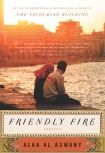Chicago by Alaa Aswany (crime books to read txt) 📗

- Author: Alaa Aswany
Book online «Chicago by Alaa Aswany (crime books to read txt) 📗». Author Alaa Aswany
Matters, however, did not stop at Henry’s door. It seemed he spread news of my relationship with Wendy in Jewish circles at the university. Some second-year students began harassing me. I was attending the general course on histology with them. I was the oldest student, and in the past they had treated me with respect, but they suddenly turned. Whenever I passed by them they would whisper and laugh. I ignored them at the beginning, telling myself that perhaps they were laughing for reasons of their own and that I should resist negative thinking so that my relationship with Wendy might not give me a persecution complex. But their harassment grew worse: whenever they saw me, they followed me and repeated provocative words. The most insolent among them was a tall, skinny young man with red hair and slightly protruding upper teeth who wore a small black skullcap on his head. He played the clown for the benefit of his friends. Whenever he saw me he would shout loudly “Assalamu alaikum,” then they would all burst out laughing. I kept ignoring them until he surprised me after class on Friday, surrounded by his friends, stopping me with his hand, acting in an unbelievable childish manner. He asked me derisively, “Where are you from?”
“I am Egyptian.”
“Why are you studying histology? You think it is useful in breeding camels?”
They all burst out laughing. That time I couldn’t control myself. I held him by his collar and shouted, “Speak politely or I’ll break your head.”
I was holding him with my left hand while my right hand was free. That was to my good fortune because he punched me in the stomach, but I jumped backward, which softened the blow. I pulled him toward me then aimed a punch at his face with my right hand. My fist was fast and the punch was strong; it made a muffled thudding sound and his nose began to bleed profusely. His defeat was now certain, so he started wailing, “You’re a barbarian. I’ll get you kicked out of the university for this.”
His friends split into two groups; some spoke with him and others looked askance at me. I don’t know how the university police appeared on the scene. They took us all to the security office. In front of the old, completely white-haired policeman, my adversary said that I had been following him and harassing him for some time and that he insisted on his right before the law because I had assaulted him. I kept silent until the officer questioned me. I told him what had happened and said calmly, “Yes, I actually hit him because he insulted my country and made fun of it.”
“What did he say about your country? Try to remember the exact words.”
He bent and wrote down everything I said. Then he looked pensive and said in a calm voice, “Listen, both of you, according to university regulations you have committed two violations: you (and he pointed at him) used racist language to denigrate your colleagues, and you assaulted one of your colleagues. If I finish the report against you, both of you would have a disciplinary hearing.”
A profound silence prevailed. I started imagining myself going back on the plane after being expelled from the university. I came to as the officer, who smiled and looked kind for the first time, was saying, “It’s possible, of course, if you both wanted, for the matter to end amicably, if you both exchanged apologies now. In that case it would be enough if you both pledge not to do it again.”
The other did not give me an opportunity to think. He came over to me and said in a loud voice, “I’m sorry.”
His apology was devoid of any remorse. He just uttered the words, as if playing a role in a play, as if he wanted me to understand that in reality he was not sorry for what he had done, but that he had to apologize for fear of the disciplinary board. I looked at him for a moment and said, “I’m sorry too.”
The harassment bothered me, but I didn’t let it take up too much of my time. I had gotten used to my new life and my morale improved. I took up my studies regularly and seriously and almost finished my new poem. My dates with Wendy washed away my sorrows. More important, I found a great friend. I will always be indebted to Dr. Karam Doss for the wonderful times we spent together. We met on weekends at Graham’s house, and during the week he would often call me to have a drink together in Rush Street. I discovered that he was a wonderful human being, extremely modest and sensitive, a true artist. We listened together to Umm Kulthum, about whom he was quite an expert: he knew the story of every song and when it was broadcast for the first time. He loved Egypt so much that he followed everything going on there with the utmost interest. We spent long hours discussing conditions in Egypt. He spoke enthusiastically, which made me share ideas with him as soon as they occurred to me. On Sunday evening we were, as usual, drinking at Dr. Graham’s house. I waited until we had a few drinks to get us going, then asked Karam, “Have you heard about the demonstrations in Cairo?”
“I saw them yesterday on al-Jazeera.”
“What do you think?”
“You think a few hundred demonstrators can change the regime?”
“Had it not been for the central security cordon around the demonstrators, all Egyptians would have joined them.”
“It seems





Comments (0)